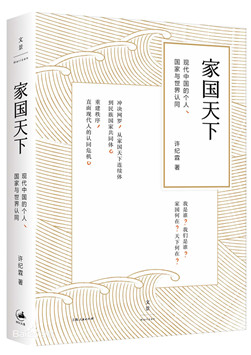
. > WHAT'S NEW > BOOKS
Identity crisis of Chinese people, society
Author : WANG HONG Source : Chinese Social Sciences Today 2017-04-10

Family, State and the World
Author: Xu Jilin
Publisher: Shanghai People’s Publishing House
Family, State and the World is a book on the history of thought of modern and contemporary Chinese society. Whether it is included the guidelines of the Great Learning, or used in civil culture and daily life, the expression “family, state and the world” has specific connotations. Mencius revealed the logical connection between the three parts when he said that “family lies at the core of the state, and the state is what the world is all concerned about.”
The idea contained in the expression has long penetrated people’s codes of conduct and become a part of community culture. However, this important issue has rarely seen serious treatment. The ignorance is essentially caused by the fact that the tradition of “family, state and the world” has become eroded through centuries of conflict between the East and the West. Though fragmented, these ideas are still evident in the fabric of Chinese society.
In the book, Xu assumes that traditional ideology is the unique identity of Chinese people. If the identity of Westerners is deeply connected with the disenchantment with a world dominated by Christianity, then the Chinese identity crisis originates in the possibility of a broken country in the late Qing Dynasty and the beginning of the Republic of China period.
Questions, such as the meaning of individual existence and self-identity as well as the relationship between these concepts and institutions, along with questions regarding transcendent spirit in a secular age, all emerged amid the devastation of a political and psychological order that had long been taken for granted. Based on the Western experience, Charles Taylor described this historical process in Modern Social Imaginaries as the “great disembedding,” while in Xu’s book, China went through a similar disembedding process in the late Qing Dynasty, which fully blossomed during the May Fourth movement.
The identity issue the book focuses on is the common challenge the modern world faces after the “great disembedding.” Xu argued that modern identity has two aspects: one is community identity based on political order while the other is spiritual identity based on spiritual order. The former is about national identity while the later corresponds with individual identity.
As with the rise of a nation, the rise of individualism is also one big event of modern China. When isolated individuals become “disembedded” from the logic of “family, state and the world,” they are unprecedentedly pushed into the tumult of the times. On the one hand, individuals became subjects, given the freedom to choose and the ability to sense. On the other hand, they were deprived of transcendent foundations, facing threats from materialism, utilitarianism and even nihilism.
The book explores the ideological complexity of modern Chinese society, and attempts to show that the rise of individualism may go hand in hand with the rise of the country. Chinese scholars who inherited the traditional view of “family, state and the world,” should provide an integrated outlook that abandons binary contradiction.
Ye Shengtao made Chinese fairy tales from a wilderness
Ye Shengtao (1894–1988) created the first collection of fairy tales in the history of Chinese children’s literature...
-
How northern ethnicities integrated into Chinese nation
2023-09-18
-
Mogao caves
2023-09-12
-
Mogao Grottoes as ‘a place of pilgrimage’
2023-09-12
-
Time-honored architectural traditions in China
2023-08-29
-
Disentangling the civilizational evolution of China
2023-08-28
-
AI ethics in science fiction
2023-08-23













 2011-2013 by www.cssn.cn. All Rights Reserved
2011-2013 by www.cssn.cn. All Rights Reserved